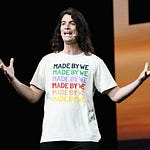Welcome to another Oversharing Podcast Experience! Walt Hickey is a friend and author of
, a fabulous indie news roundup which also happens to be the only daily newsletter that I actually read. Walt is somehow also senior data editor at Insider, where he was part of the team that won that 2022 Pulitzer in illustrated reporting for this powerful piece on a Uyghur woman who was placed in and escaped a Chinese internment camp.Walt is a delightful thinker and commenter with a truly vast array of knowledge. In this episode, Walt and I take a break from the sharing economy to talk about telling stories with data, some of my favorite things from recent issues of Numlock, and whether the collapse of Twitter could be good for blogging. You can find Walt on Twitter and of course at his terrific Substack,
.Oversharing: Can you tell people a bit about Numlock? The premise is that every new item in the newsletter has a number, and I think it’s so interesting that you have this concept of organizing the news around numbers.
Walt Hickey: Numlock I started in 2018. Before that I was at FiveThirtyEight and I was doing their daily morning newsletter, which I started there. That was Significant Digits and it has since left this world. But I’ve been doing this for going on eight years, it might be nine years. The gist is of it is, I am a data journalist by trade. A lot of my day job work and my personal writing and the reporting that I tend to do is very grounded in numbers. And I think that data journalism is very useful angle, right?
Whenever I try to explain what data journalism is and how it differs from traditionally reported journalism, all it is a shift in perspective. So, if you were writing a story about a busy street that has accidents and why there should be a stop sign there. Traditionally if you were to report that story, you’d go to the business owners in the area, you’d go to the mayor, and then at the end of your reporting, your editor would be like, ‘oh, by the way, just call the DOT and throw in how many crashes happened at that location,’ and that’s your story.
Classic vox pop.
Your classic vox pop. All data journalism does is invert that. You’ll start with, let me get all of the intersections in the city, and I’ll rank them by how many accidents are there, and this one’s the top one. And now that I know that, I’ll go to the mayor and show them that number. I’ll ask the business owners around the city what they think about this number. All you do is kind of invert the process a little bit. And I think that it’s a really valuable perspective. I don’t think it’s the only perspective, which is why Numlock in general—you and I have talked about this—is a fairly supplemental newsletter a lot of the time.
I was saying before we started, my favorite thing about Numlock is that I get my news from a couple bigger publications: BBC, Washington Post, various other places. That I feel like tells me what I need to know to be a person in the world with a grasp of U.S. politics and European politics, because I live in London. And then I read Numlock, and it’s like, did you know rats have rhythm?!
Yes, but that’s exactly what I’m going for. Because again, the gist of it, to take a step back—all Numlock does is in those original stories where it’s like ‘add in that stat to paragraph seven’; all it does is basically bubble those up across every story within it. And all these news stories are highlighting cool facts.
The thing that I love about data journalism just conceptually is that I think that—you and I both know this and there’s a lot of reasons for it—but there’s a lot of skepticism about media and a lot of skepticism about journalism. And I think that a lot of that is not particularly well-founded, but I do think that some of it is absolutely well-founded. I think that we should be encouraging people to be skeptical about what they read. And so to that end, what I love about data journalism is I think it’s a good stroke in your favor to really try to not just be like, here’s why I reported this, here’s the tips that I got, the people that I interviewed, and all that. Bringing in a hard number to anchor it on is a valuable journalistic tool. That’s the kind of thing folks can get behind.
I’m not saying that there’s anything fundamentally better or objective about numbers, because obviously numbers have some subjectivity to them constantly. But I do think that as we try to bridge this gap between folks who are probably overly skeptical of media and the things that we write, a really good olive branch is: here’s the number that I called the city and got. This is why I wrote this story and this is why I think this is important. I think it’s a help, and I think that journalism is only as good as the folks who consume it and take it in. I think data journalism has a lot of potential.
Of course, the flip side is it’s also fairly easy to manipulate data to say what you want to say. I feel like if you’re a business reporter or a startups reporter, it’s necessary to also have a degree of fluency with data and numbers. Because so much of the job is evaluating these numbers that you get from companies and first doing a gut check: does that seem reasonable? Does that check out with what I know about the industry, with what I know about competitors? Second, where is this coming from? What questions are they asking? Who’s in their sample size? What is the universe they’re looking at? Are there factors that I haven’t been told that are affecting the outcome of this? And that’s so much of what I felt like my job was, especially with Uber and Airbnb and a lot of these companies that were building out in-house economics teams to produce papers that bolstered their policy positions.
Yeah, and I think with business reporting—you’ve hit something very cool—which the thing that I like about business reporting as opposed to other types of reporting is that there is a genuine asset in covering business in that if you’re a publicly traded company, you have to be honest with the American people four times a year. And that is fascinating. And if you’re not honest, you go to jail. And like, that doesn’t happen in politics! That doesn’t happen anywhere else! Legally speaking, you can’t lie.
And so to what you were saying just there, it’s really interesting how much you need to separate out what is literally the balance sheet versus what is the bells and whistles and sometimes the smoke and mirrors. I feel like I’ve read in Oversharing a ton of times where they’ll come up with these individualized statistics that are just so processed and so synthetic. It’s like this divided by this, divided by this times this that. They’re trying to sell that as a proxy, but you can tell that they’ve loaded so much noise into that, that it can be distracting. I have a lot of respect for the business reporters who do that particularly well, and I think that genuinely some of the best data journalists out there who don’t consider themselves data journalists are on the business beat.
Related to what you were saying about SEC filings and corporate reports, arguably the SPAC has not been good for the economy, but it’s been amazing for business journalism. That’s why we have access to Bird and Helbiz, and all these other companies that probably wouldn’t have gone through a traditional IPO, but they did a SPAC and they had to release a pitch deck and all their projections and it’s an incredible trove of data.
You and I were talking about this when you came on Numlock last week, how there’s a moment where a private company that can raise money based on vibes and who the leader of the company is and what private equity and the VCs think about the vibe of this company—there’s a moment of reality when they hit public markets. That can be very challenging, as we’ve seen especially on your beat lately.
Yeah, totally. I think part of the reckoning that the sharing economy is going through right now is that half of it is the overall tech burst and the selloff in the tech market, and then half of it is these companies that traded for a long time privately on vibes and enthusiasm and public investors are just less down for that, you know?
Public investors have been in this game for a while, and it’s very much like, you can say that you’re going to be the next Disney, but if you’re not actually putting up some numbers, then all of a sudden, I don’t think so. That’s why I think numbers are so fun in that regard, because you can see when people have to stop playing with monopoly money and start playing with actual money. How the incentives change and the priorities change, and the actual perspective on this stuff.
I thought we could talk about some of the Numlock stories that you’ve had recently that I loved.
Awesome.
So first, you have an affinity for stuff about songs and pop culture. That’s a running theme throughout Numlock that I always enjoy—movies, songs. You had one recently about how 38% of the top 10 hits are now less than 3 minutes, up from 4% in 2016. And I was like, this is fascinating, also because it’s a business story. It’s about how the business model of streaming music has changed the way music itself is made.
Yeah! There’s this story and then there’s another story that I wrote up, I want to say last week. The one that you’re talking about was a Billboard story that basically was talking about how the fundamental incentives of streaming media—you get paid by the song, not by the minute, and as a result, why not load up an album with more songs that are shorter than fewer songs that are longer. The other half of this is obviously TikTok, where you’re not being judged by three-and-a-half minutes. You’re never being judged by your bridge, your guitar solo. You’re always going to be judged by that 15- to 20-second clip. And so if you have a good hook and you have a good clip, you don’t need to build out a three-act structure and a song for it.
The other story that I want to bring into it was published in a really outstanding newsletter called Tedium by this guy Ernie Smith. This article was by this Chris Dalla Riva, who I’ve known for a while. He’s been researching and working in this space for a while and I’m really fond of his stuff. And he came out with a story in Tedium about the death of the key change—how over the past 30, 40 years, songs aren’t changing keys as much as they used to. And
So it used to be—and again, I’m going off the dome here, so forgive me if my numbers are a little bit off—but it used to be a solid percentage of songs, maybe between 30-40%, would have a key change at some point in it. They did a shift out through the bridge. They did a guitar solo. They did the Beyonce love on top, right? Where you’re just kind of going through keys and keys and keys. And what this fellow found was that’s kind of stopped. And what he attributes that to is A) streaming music to an extent, but B) the software tools that we’re processing music with. It’s not like, you know, Paul McCarney would sit down on a guitar and write “Hey Jude” and then be like, okay, then here I’ll do a key change and then go to a different chunk. They would basically look at the whole song as here’s the first part, the second part, third part, four part.
Like a sonata.
Exactly. But now when you have GarageBand or any of these linear tools, you’re looking at the unit of a song, not as in the arcs of it, but rather individual hooks and stuff. And so this guy was able to track well, you know, since we’ve had digital processing tools to make the music—not just digital processing tools to distribute it, as we’ve seen on the other side—that’s also changing the way that we listen to music because it’s changing the obvious incentives of just like, if you’re looking at, if you’re scrolling along, it’s not as obvious that here’s a great place for a key change. I think that’s also a business story like you were saying, which is the tools that we use to create, develop, produce, and distribute music is actually changing what is music at this point, which is really fascinating.
And again, that’s the kind of story that I wouldn’t get in BBC or WaPo or the New York Times. I only get stuff like that in Numlock. Okay. Next also in entertainment. Can you explain to me the Taylor Swift-Ticketmaster battle?
This one is also a larger controversy. Basically, Ticketmaster and Live Nation were the two largest ticket sellers in America, and a couple years ago during the Obama administration, they were allowed to merge. There’s a couple people who have been really big on this kind of issue. One of them is I think our mutual friend, Pat Garofalo. He writes
and I am constantly enamored with his work. He’s big on this, but basically, these folks were allowed to combine and they have fairly unprecedented bargaining power within the music industry, between the venues and the people who want to buy tickets to those venues.This had gone on for a while. I don’t know anybody in America who hasn’t been fucked over by Ticketmaster at one point in their life. And part of that is that they exist because somebody’s got to be the bad guy within the industry, somebody’s got to jack up the rates. The artists are kind of happy because they’re getting more money. Venues are kind of happy because they’re getting more money. Ticketmaster is happy to book their fee and post their profits as that middleman, with the understanding that you’re not going be mad at The Mountain Goats and you’re not going to be mad at any of these theaters—even though they’re the ones who are making a little bit more money off of it—because of this middleman, Ticketmaster. The thing is though, that can only work for so long, and they managed to tick off Taylor Swift fans.
They had a pre-sale, but then the pre-sale crashed, and so they moved the pre-sale back a day. Then after the pre-sale they announced that they’re canceling the actual sale because the pre-sale was so successful. That just left like 2 million Taylor Swift fans in the lurch, and there’s a lot of fans that I don’t want to tick off, but Swifties are like, this is a group of people who are fairly renowned for their capacity to hold long running grudges. I think Tom Hiddleston can cop to that fact. Nevertheless, I would not wanna be on the wrong side of the Swifts and yet, Ticketmaster has found themselves there. If I ran Ticketmaster, I would find being broken up by the FTC preferable to evoking the ire of 2 million Swift fans.
The last recent Numlock story, which I’ve already alluded to, that I want to talk about is, rats have rhythm.
Yes, rats have rhythm.
How, how did you find this story?
I follow a lot of scientific media, whether it’s Scientific American or Nature or any of that kind of stuff. I follow their feeds, and you have these papers come out all the time. I think this one might have been on NPR, but I saw it in a couple different sources. The gist is that intuitively, if you have a beat, humans are going to bob their head to it. We have a fundamental sense for bpm and that’s the thing that we know happens. We tap our feet to tunes whether we know those tunes or if they’re in our language or if we have a history with them. There’s a fundamental thing about us that we have an innate sense of rhythm. And from that springs our entire love of music.
What these folks did was basically they played different songs to rats who had never heard these songs before.
I believe there was a combination of Mozart and Lady Gaga?
The crux of it was Mozart, but they also played “Born This Way” by Lady Gaga, and then they also played, I think, a Michael Jackson song, and a few others. What they found was that in that little sweet spot—the same kind of sweet spot that we have, between like 120 and 140 bpm—they noticed that the rats would bob their head a little bit. It wasn’t perfect every time, but you never expect it to be. But they’re then suggesting that rats might also have an innate sense of rhythm, which for me meant that obviously we need a Ratatouille sequel that factors this in. My idea was, there’s this fantastic movie starring Cate Blanchett out called Tár, where she plays a director, and I’m suggesting Rat-Tár-touille, where a rat just wants to conduct the Berlin orchestra.
I think it’s a great idea.
I’ll let whichever Bob is now running the company now that this is the thing that we all want in America.
Is there anything else you want to tell the Oversharing community before we wrap up?
Again, it’s always nice to talk to folks who are also doing this like newsletter life. I think that you and I were drawn to it at similar times in our lives. I would love to talk about that for a little second because it is like, again, when did you start Oversharing?
I started in 2016 and I’ve said this a couple times, but I really started it just because I was doing a lot of reporting and then I would have these scraps or outtakes that would get cut from a story because they were too niche or too wonky or too in the weeds. And I was like, but actually this is the linchpin of the whole thing! Because if you don’t understand this in-the-weeds piece of data, the rest doesn’t make sense. Maybe I’ll just put it in a newsletter and send it out to people. So I did that for a bit, I like put 50 people on the first one and then it just started growing and it turned out other people liked that too. And that’s how Oversharing happened.
I feel like both you and me were like in the pre-Substack newsletter era of things.
I started on TinyLetter.
Yeah, when I left FiveThirtyEight to start Numlock, it was on MailChimp. It has been really cool to watch it evolve and see how folks have—like it is kind of a rebirth of blogging. I know that you and I are viewing ours as ‘publications’ a bit more so than blogs. But it has been nice to see it grow just because I do think that, as we’ve seen with Twitter lately, it is really valuable to have a more direct conduit and a durable conduit that a billionaire can’t fuck up for you.
Totally. I’ve never felt so future-proofed against the Twitter collapse as this past week.
100%. I do think that the Twitter collapse is bad for a lot of reasons, and I hope that Twitter exists by the time that folks listen to this, because I’ve spent a lot of my life on the platform and I’ve had a really good time on it, in general. I’ve met people that I never would’ve met—
Actually, can I confess a secret.
Of course, hit me.
I’m almost never on Twitter. Did you know this?
No, really?
I spend most of my life logged out because if I’m on Twitter, I get nothing done. I’m just reading Twitter and laughing at funny tweets and going down rabbit holes. I do not have the Twitter app. I usually full log out. And then what happens is I’ll see a story eight hours later that broke on Twitter and I’ll text my journalist friends being like, ‘whoa, this is crazy.’ And they’re like, ‘oh my god, Ali, you’re so behind, you have to be on Twitter more.’ And I’m like, ‘I’m sorry. I was working.’
Rude. That’s funny. It’s, it’s so funny who is secretly using it constantly. One thing I’ve noticed about the Twitter implosion is you’ll sometimes look at an Elon Musk tweet, and then you’ll see in the mentions, you’ll see a person who you thought was completely normal just randomly hamming up in the mentions. I always forget sometimes people have a dual life as just a reply-guy, pit-fighter on a billionaire.
But yeah, I like it because I think that it put a little bit of the fear of god in some journalists who I think would be very good at blogging, but who just let Twitter be the dump for it. You mentioned like, I love pop culture stuff and, that is very, very true. And I’ve been worried about pop culture lately because I think a problem that it has is—I don’t want to get too into weeds here—but it got like podcast-captured, where the best writers and the best bloggers about pop culture all got a podcast.
And that’s great because I listen to many of their podcasts. But the problem is that I will hear them say things on the podcast that are really excellent takes, that in a different era would’ve been a blog and then they would’ve posted it on Twitter, and then it would’ve been a great discussion to have and it would be a thing to link back to. It would advance the cause of criticism in its own little, tiny way. But when you have it in a podcast, it’s very hard to like hand people a 60-minute audio file from a decade ago and just be like, here’s a really good point about the Sopranos. But the Twitter thing scaring the hell out of people I think takes things that would’ve otherwise been ossified into podcasts or just fired off once or twice as tweets and it might actually get us back into that bloggy phase that I think was really, really good for journalism and writers and criticism and art and all that kind of stuff. And so, I hope that we come away from this a little bit better than we otherwise were.
It’s good to be optimistic.
But anyway, you and me early to the punch. We’re very good on that.












Share this post